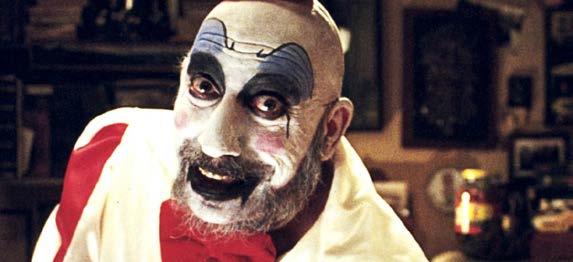
5 minute read
RUTANYA ALDA
INTERVIEW – ACTING IN HORROR:
A WOMAN’S PERSPECTIVE SPOTLIGHT: RUTANYA ALDA
Advertisement
by Ellen Vass Sanderson
Hello, Rutanya!
We’re honoured to have you here as our Women in Horror.
1. How long have you been acting, both in general and specifically within the horror genre?

I’ve been acting since 1969 in film and I did my first horror movie in 1979, When A Stranger Calls.
2. Have there been certain life events that led you to an acting career in horror, as opposed to in other genres?
No, ha, it’s not that I chose to be a horror actress, it’s just that the opportunity to audition came up and I got the parts.
3. What is your favorite/least favorite sub-genre to work in?
No opinion. The quality of life on set is about the people you’re with, not the sub-genre you’re in. A good script is a good script.

If you’re working with really good directors, good crew, and wonderful actors, then of course that makes it something really special. However, a lot of people that make these movies don’t know what they’re doing. I don’t want to put down indie films or low-budget films – I’ve been in wonderful ones with talented professionals, like Brian De Palma in his two early films Greetings and Hi, Mom! which were made on a shoestring. But just because you have an idea and financing doesn’t mean you know how to make a movie. Bad directors, amateurish crews, unprofessional casts wear you out, there’s a lot of screaming (and not just in character), and I’ve found there to be a shocking lack of safety (I was injured on the set of a film I don’t want to plug in any way). But once you’re on set it’s too late to learn, at least that time around. And you don’t necessarily know what you’re walking into as an actor until you’re there standing in the shit.
5. Which horror films, or projects, have been your favourites to work on and why?
Working with Damiano Damiani and the cast of Amityville Ii: The Posession was a really positive experience; he was really smart, had strong points of view, and encouraged actors to share and synthesize their points of view with him. George Romero was another wonderful director to work with – I did his The Dark Half. He was gentle, kind, low-key, didn’t scream, talked to the actors, worked scenes out in detail before shooting, maintained calm, orderly sets, and did very professional stunt work. It was a joy to work with Timothy Hutton, my partner in The Dark Half, as well.
6. What are some of your observations, thoughts, and/or experiences when it comes to female vs. male nudity in horror films?

Rarely is nudity necessary or effective in a “horror” film – I think it belongs more in the earthiness of drama, or even the body humor of comedy. Unless there’s a graphic injury, moldering corpses, squeamish torture, or some bizarre body-animal-demon-thing transformation, the human body isn’t very scary, though situations it’s exposed in can be I suppose, and even then there are all sorts of ways to shoot or just imply nudity more effectively or ineffectively than others. From what I know, in horror nudity is usually totally gratuitous, exploiting people, men and women, but mostly women, to sell a bad script. But all genres can be guilty of that, to be fair.

8. Which titles might we see on a personal list of your favorite films?
East Of Eden
Splendor In The Grass
Wild River
High Noon
Cinema Paradiso
Il Postino
I Wrote A Letter To My Love
East/West
As It Is In Heaven
The Lives Of Others
Departures

and the only film that ever scared me was Vincent Price’s House Of Wax.

I don’t think actors want a genre-based career, maybe some do, but everyone I came up with and worked with just tried to get work as an actor, ideally good work, but more practically any work so you can scratch out a living. If you’re associated with certain films, that probably creates a wave with certain producers that you can ride for a while, but I don’t think you need to limit yourself. You’re limited enough by things well beyond your control. I don’t know if there’s a way to avoid type-casting. I think almost everyone is “typed” from the get-go, from the moment you walk into your first audition, maybe your first drama class. Just try to develop as much of yourself as possible so you can be known as a “character actor” as opposed to “that person who does that one character over and over.” Unless that’s working for you, then enjoy your success.
10. Are you currently working on any projects?
I have one very well-reviewed book out right now about my experiences in film, The Mommie Dearest Diary: Carol Ann Tells All, which has a substantial section on my early life, entrance into film-making, and anecdotes from my career. I’m currently working on three others: An autobiographical one-woman show, a screenplay for young and old adults, and a biographical piece on a noted actress/teacher. More on those another time.
Well I do hope you’ll come back to discuss your books with us. I certainly look forward to reading them! Again, sincerest thanks for being with us, Rutanya. Best wishes! ~ Ellen



Interview by Ellen Vass Sanderson

























